
As consumer demands for the quality of agricultural products continue to rise, contract farming is becoming increasingly important. It is particularly important for stabilizing the agricultural supply chain and safeguarding the interests of both parties in the trade of agricultural products.
However, does a "contract" mean that the sale of agricultural products is "unhindered" throughout? How can the interests of both contracting parties (buyers and farmers) be maximized?
Recently, Zhang Wei, a researcher in the Hundred Talents Program at the Department of Service Science and Operations Management, School of Management, Zhejiang University, and his team published an article entitled "Dynamic incentives for sustainable contract farming" in the top international journal Production and Operations Management (UTD 24 journal), in which they developed a new contract farming model based on game theory.
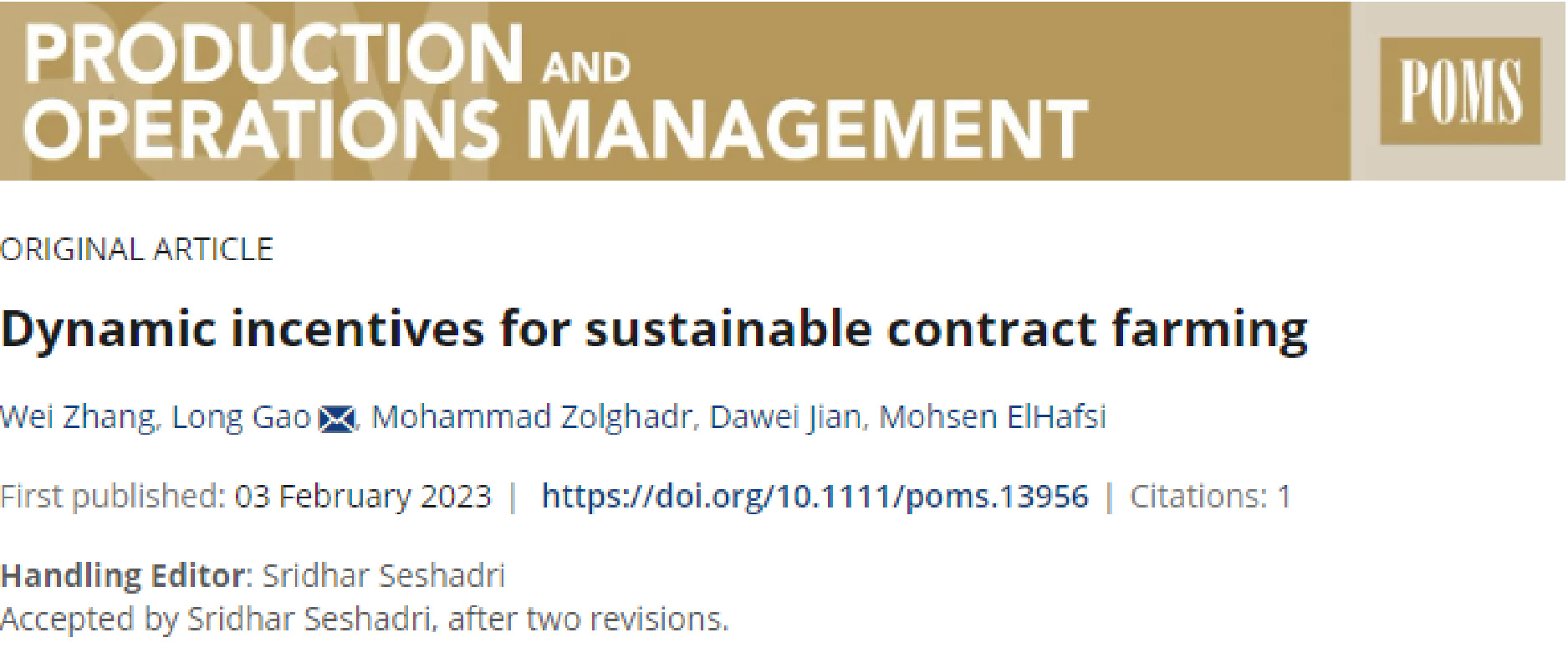
Click here to access the journal article
|
ZHANG Wei | 张伟 School of Management, Zhejiang University |
||
|
|
||
|
|
|
Academic Background: ZHANG Wei is a researcher in the Hundred Talents Program at the Department of Service Science and Operations Management, School of Management, Zhejiang University. Research directions: Mechanism design, information design, supply chain management, medical management, and revenue management. You can learn more about Prof. ZHANG Wei’s academic background here |
|
Researchers Have Observed That Many Contract Farming Practices Use Long-term Contracts to Improve the Stability of the Agricultural Supply Chain |
Contract farming originated in industrialized countries. It is a model of agricultural production and supply chain management in which farmers enter into contracts with agricultural companies or other buyers to agree on the terms, prices, quality standards, etc. for the production of agricultural products.
For example, in fruit production, farmers enter into contracts with exporters or local supermarkets and plant and produce according to the cultivation methods, quality standards, harvest times, etc. specified in the contract to ensure that product quality meets market demand and standards and avoids waste or unsaleable problems.
ZHANG Wei’s team has found that this model not only provides farmers with a more stable market and higher income, but also helps buyers to ensure the supply and quality of the agricultural products they buy.
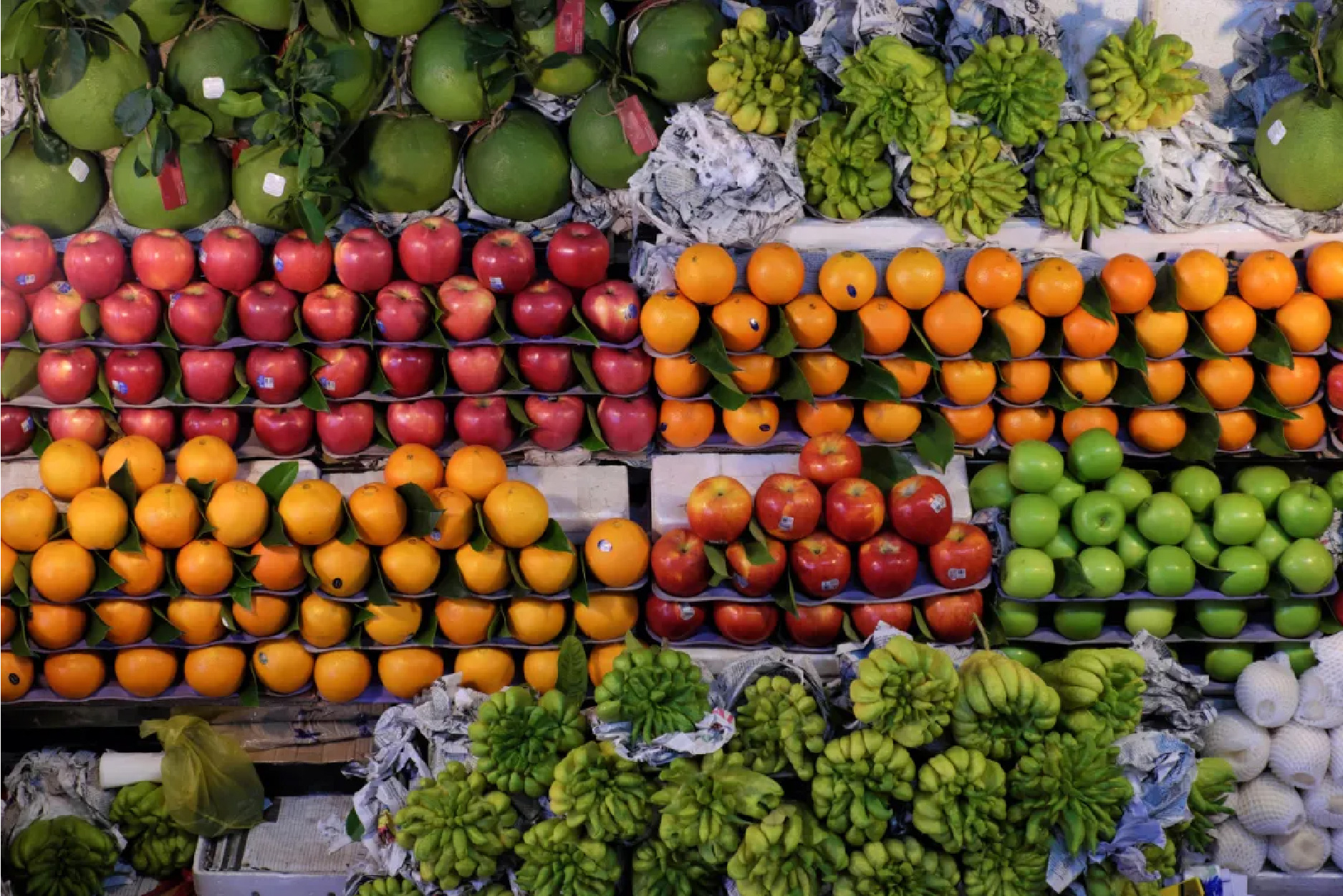
|
Image source: ©千库网 |
Starbucks’ sustainable coffee program has also caught the attention of ZHANG Wei’s team. In 2016, Starbucks partnered with Conservation International to invest in a new project in Oaxaca, Mexico. The project focuses on creating a net positive profit model to revitalize coffee farming as a sustainable livelihood.
Oaxaca was once a major global producer of high-quality specialty coffee, but production has declined dramatically due to climate change, lack of market access, poverty, migration, and other issues. Starbucks will work with local partners to improve farmers’ shade management and develop alternative sources of income. The goal is to stabilize farming communities in Oaxaca so that farmers can continue to grow coffee. In addition, the project provides training to growers on freshwater resource conservation and seeks the active participation of women, local farmers, and their families.
Contract farming can not only help protect the environment and maintain ecological balance, but also promote economic growth and social justice, thus achieving coordinated economic, social, and environmental development. ZHANG Wei realized the importance of contract farming in promoting sustainable agricultural development, and he was determined to start this research.

|
Image source: ©Starbucks official website |
In his research, ZHANG Wei found that it is not uncommon for farmers and buyers to work together in business through contracts. However, not all contracts have a "long-term vision" like the "Sustainable Coffee Plan".
The agricultural production process is influenced by many random factors such as climate and has high demands on technology and production. To cope with these uncertainties, farmers need to continuously invest in improving production technology and management skills to reduce risks and increase income stability.
In this particular industry context, ZHANG Wei’s team found that long-term, stable agricultural contracts can motivate farmers to continue to invest and dynamically deploy their energy to improve productivity, thus promoting the development of the agricultural industry. The research team noted that previous studies have provided little guidance on agricultural development from the perspective of "dynamic incentives"
|
Researchers Created A Learning and Strategy Model for Farmers and Discovered the Win-win Mechanism of Long-term Contracts for Traders and Farmers |
ZHANG Wei’s team constructed a model based on game theory that captures the learning and strategic behavior of farmers and depicts the dynamic evolutionary mechanism that contributes to a better understanding of agricultural cooperation relationships.
Long-term contracts can motivate farmers to produce. Exploring farmer motivation to improve cross-margin efficiency.
The contract that maximizes the buyer’s long-term profit is called the optimal long-term contract. In their study, ZHANG Wei’s team characterized the features of the optimal long-term contract, which includes performance wages and deferred payments.
Performance pay means that farmers receive a performance-based reward in addition to basic payments if they can complete production more efficiently and with higher quality. This feature can motivate farmers to invest more energy in production, be willing to incur more costs, and continuously updateand improve production facilities, thus increasing production efficiency.
Since the production of agricultural products is subject to great uncertainty, the quality and quantity of the final product are rather random. At this time, through deferred payment, traders can encourage farmers to share the true situation (private information) of the production process and make production activities more "honest" over time, maximizing the interests of both parties.
ZHANG Wei’s team studied the impact on the interests of traders by adjusting the contract parameters. Based on the model data, they found that the optimal production quantity of a product can fluctuate both upwards and downwards compared to the production quantity with complete information, depending on the characteristics of the farmer’s learning curve. For example, the model curve can be used to further analyze whether farmers with high historical production efficiency have a higher marginal learning rate or farmers with low historical production efficiency have a higher marginal learning rate.
The study thus showed that the private information in the production process does not necessarily harm companies if the dynamic incentives created by long-term contracts are taken into account.
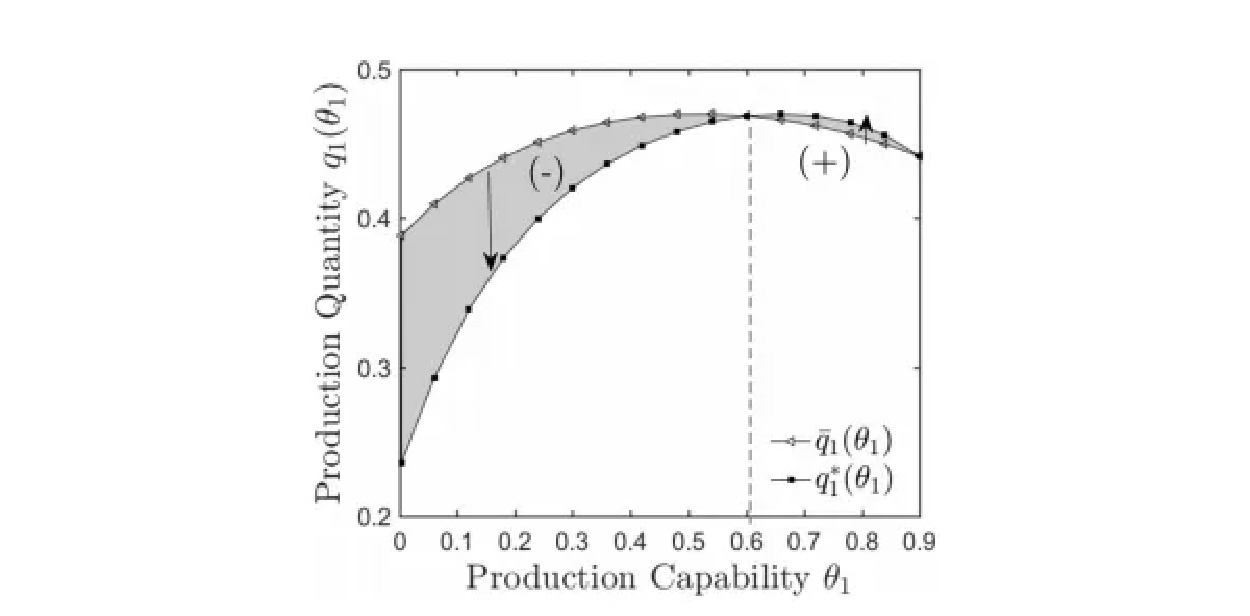
Farmer learning curve | Table from the Research Paper
Long-term contracts can incentivize farmers to be more productive and improve farmers’ production efficiency.
In addition, by analyzing collected data, ZHANG Wei’s team found that long-term contracts can improve farmers’ ability to control product quality. If the learning effect is strong and the cross-period carryover effect is significant, long-term contracts have a significant effect on improving the profits of farmers and buyers.
Research shows that with contracts that pay more attention to long-term effects, farmers gain more production experience over time and with more incentives, and continuously improve their ability to “learn by doing,” thereby increasing farmers’ productivity and income and creating shared value.
This means that traders can "manipulate" farmers’ production capacity through the design of contracts. Studies have shown that if buyers have a long-term vision and can control farmers’ productivity, improve farmers’ efficiency, and create long-term and sustainable benefits for themselves, they are willing to pay higher prices to ensure that farmers can survive in the long term. Therefore, the formulation of long-term strategies can compensate for the shortcomings of short-term transactions in terms of quality incentives for agricultural products and addressing information deficits.
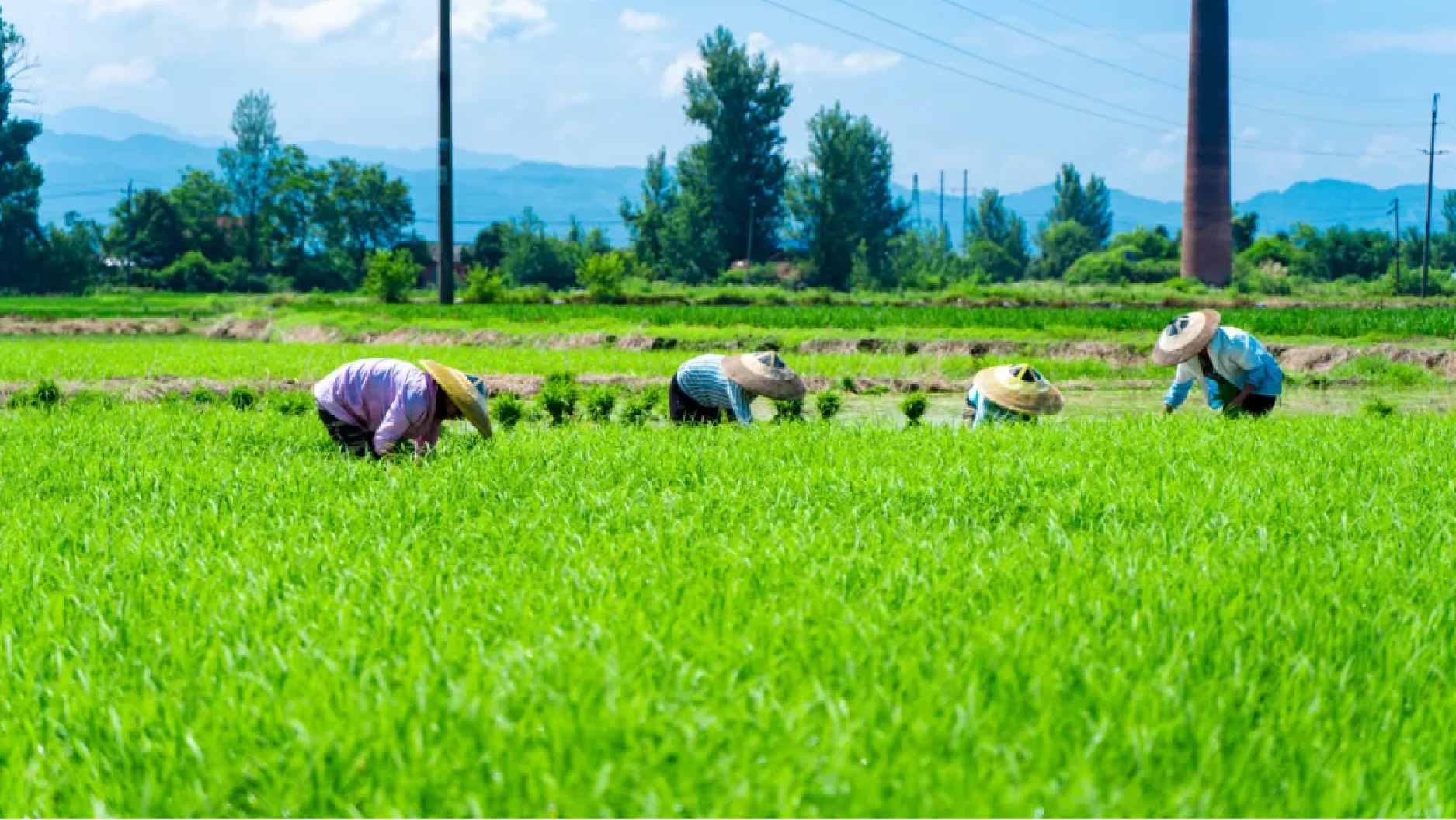
|
Image source: ©千库网 |
|
This Study Provides Theoretical Support for Contract Farming Policies and Helps to Promote the Long-term Sustainable Development of the Agricultural Industry Chain |
This insight theoretically supports the political debate on contract farming, namely that a short-term competition policy based on short-term transactions (spot trading) can have a counterproductive effect on modern value chains in the agricultural and food industry and harm buyers and farmers.
The research of ZHANG Wei’s team shows that short-term contracts have no incentive effect on product quality. If traders keep lowering purchase prices and the optimal order quantity is lower than the purchase volume of long-term contracts, farmers’ investment and efforts will be inhibited, and the learning effects accumulated by farmers over several periods of time will not be internalized, so the inherent potential for improving agricultural products will be "wasted". At this point, the supply chain falls into an inefficient equilibrium, that is, the agricultural product supply chain cannot reach a highly efficient stable state due to long-term learning and accumulation by farmers.
In addition, short-term strategies allow farmers to maintain real information advantages for a certain period of time, but they cannot provide incentives for farmers to accumulate information and production advantages in the long term. In contrast, the long-term contract strategy can compensate for these two shortcomings, improve productivity, and create shared value.
The study has deepened the understanding of the theory and practice of contract farming in academia and industry and provided a basis for the agricultural policy debate. In the modern agricultural market, traditional pro-competitive measures such as restrictive contract terms and minimum purchases on the spot market can be counterproductive. On the contrary, if traders and farmers consider the long-term benefits, they can achieve a "win-win" situation by emphasizing the key role of dynamic incentives.
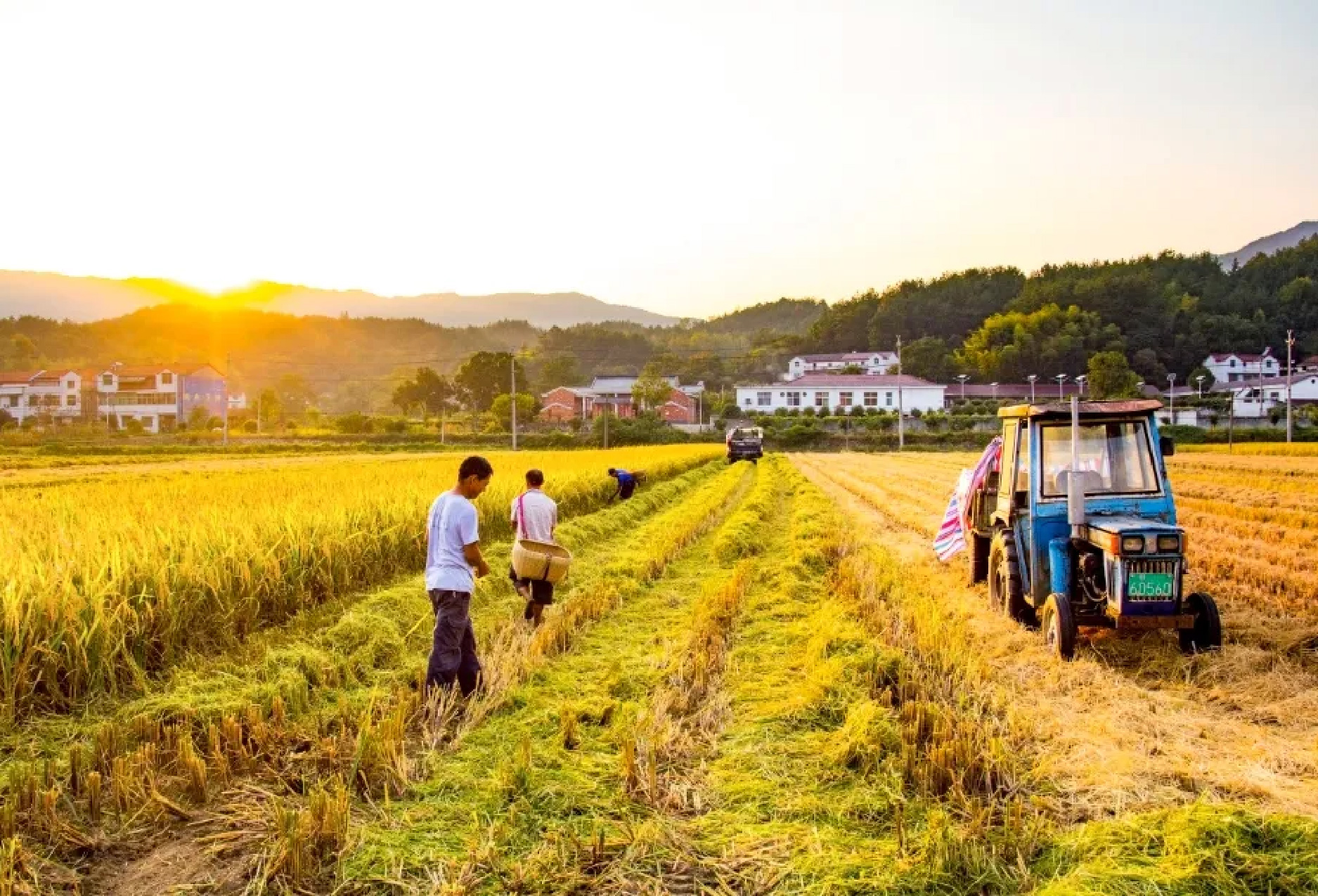
|
Image source: ©千库网 |
Supporting the long-term sustainable development of the agro-industrial chain, accelerating the development of a strong agricultural country.
The development of China’s agriculture is currently facing problems such as low production efficiency by small farmers, insufficient capital investment, difficulties in ensuring the safety and quality of agricultural products, and an insufficient supply of high-quality and differentiated agricultural products. The development of contract farming is of great significance for solving the current problems of Chinese agriculture.
ZHANG Wei’s team’s research shows that traders and farmers should enter into long-term profit-sharing contracts to make up for the lack of incentives and information in short-term transactions (spot transactions). In addition, long-term contracts can ensure that farmers’ production capacity reaches a higher state of equilibrium, thereby ensuring the long-term sustainable development of the agricultural industry chain, supporting rural revitalization, and accelerating the construction of agricultural power.

|
Image source: ©千库网 |
|
- We thank ZHANG Wei for his insightful research on dynamic incentives in contract farming. This study offers valuable guidance on managing farmers with superior information, and we look forward to applying these findings to improve decision-making and productivity in real-world farming scenarios.
- You can read the original article in Chinese here